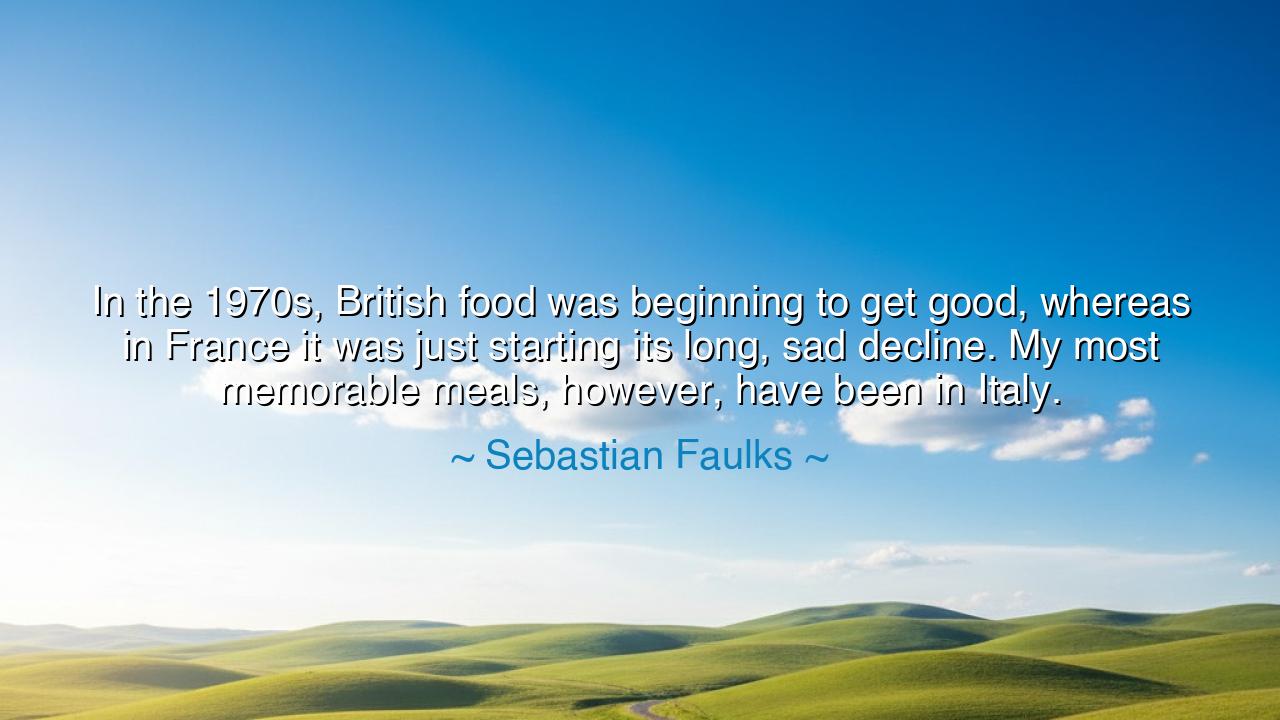
In the 1970s, British food was beginning to get good, whereas in
In the 1970s, British food was beginning to get good, whereas in France it was just starting its long, sad decline. My most memorable meals, however, have been in Italy.






There are ages in human history when even the simplest acts—to eat, to taste, to share a meal—become reflections of the soul of a nation. In his words, Sebastian Faulks speaks not merely of food, but of the rhythm of civilizations, saying, “In the 1970s, British food was beginning to get good, whereas in France it was just starting its long, sad decline. My most memorable meals, however, have been in Italy.” His voice is that of a witness to cultural transformation. Beneath this statement lies not nostalgia for flavors, but reverence for a truth: the spirit of a people lives in its food, and when that spirit fades, even the richest cuisines lose their soul.
The 1970s were a strange and transformative time. In Britain, the long gray years of austerity and rationing were finally giving way to color, creativity, and curiosity. Once mocked for blandness, British food was awakening—fresh ingredients, borrowed spices, and the rebirth of pride in the local harvest began to shape a new national identity. Meanwhile, France, whose culinary empire once ruled the dining tables of the world, began to rest upon its past glories. Tradition turned to routine, and mastery dulled into repetition. What Faulks calls a “sad decline” was not the loss of recipes, but of passion itself. When a culture ceases to love the act of creation, even its finest crafts begin to crumble.
Yet Faulks turns his heart toward Italy, calling it the home of his “most memorable meals.” Why Italy? Because there, the essence of food is not prestige or perfection—it is love, simplicity, and joy. Italian cooking, like the Italian heart, is alive in the moment: a marriage of sun and soil, laughter and labor. It honors the tomato, the olive, the grain—not as luxuries, but as sacred gifts of the earth. This is what endures when empires fade: a people who still take time to taste, to gather, to live.
There is wisdom here beyond cuisine. It is the ancient lesson that renewal belongs to those who stay humble and passionate, while decline visits those who grow proud and complacent. So it was with Rome, whose mighty walls crumbled when its citizens lost discipline. So it was with Greece, whose philosophers became entertainers when truth ceased to be their highest pursuit. And so, Faulks reminds us, it was with France’s kitchens—still ornate, still technical, but slowly forgetting the heartbeat that once animated them.
Food, like art, mirrors the human condition. When we cook, we re-enact the balance of creation—taking raw things and transforming them with patience, fire, and imagination. The decline of a cuisine signals more than culinary fatigue; it foretells the weariness of a civilization. The rise of another, as in Britain’s awakening, speaks of a people learning once more to honor both the old and the new, to find meaning even in what was once dismissed as plain. And in Italy, where the old and new dance in harmony, we see the eternal truth: that joy, when nurtured by gratitude, can outlive centuries.
Consider the story of Alice Waters, the American chef who in those same 1970s brought back to her homeland the philosophy she learned in Italy: fresh, local, simple. Her restaurant, Chez Panisse, did more than serve meals—it restored America’s connection to its soil, its seasons, its sense of place. She followed the same path Faulks admired: she found memorable meals not in grandeur, but in authenticity. She proved that the rebirth of taste begins with the rebirth of respect—for the ingredient, for the culture, for the moment itself.
Let the teaching be this: whatever you create—whether food, art, or a life—let it not grow stale in the comfort of reputation. The decline of greatness begins when the hands forget to feel, when the heart forgets to care. Be as the Italians are in Faulks’s memory: alive, generous, and unhurried, finding poetry in the act of nourishment. Seek not the perfect dish, but the honest one, for in honesty lies the flavor of eternity.
And when you sit before your meal, remember this ancient wisdom: a nation’s table reflects its soul. Tend it well. Eat with reverence, create with joy, and live with gratitude—for in these simple acts, civilizations are reborn.






AAdministratorAdministrator
Welcome, honored guests. Please leave a comment, we will respond soon